Thoughts on Peace and Safe Working Environs
Thanks for your response to the previous post
It was refreshing to see the response to the blog post on Lifting Your Spirits, here and on Facebook too. I can see why people have such a mix of feelings and passions about issues regarding machines versus hand tools and so on. I’m certain it’s because many of us feel defensive of whichever path we’re on and I think I see much of the dilemma too. Woodworking has changed in the last half century and I’ve been a part of watching the changes that transformed it from being a man’s occupation to perhaps more a pastime, an interest and a hobby. I have never liked the terms like these particularly, primarily because I have always thought they somehow diminish the significance they actually have for people. Aside from that, I, like most people I know, never had time to pass nor time for a hobby. I have always considered woodworking to be a more serious issue and that’s because it has been the way I earn my living.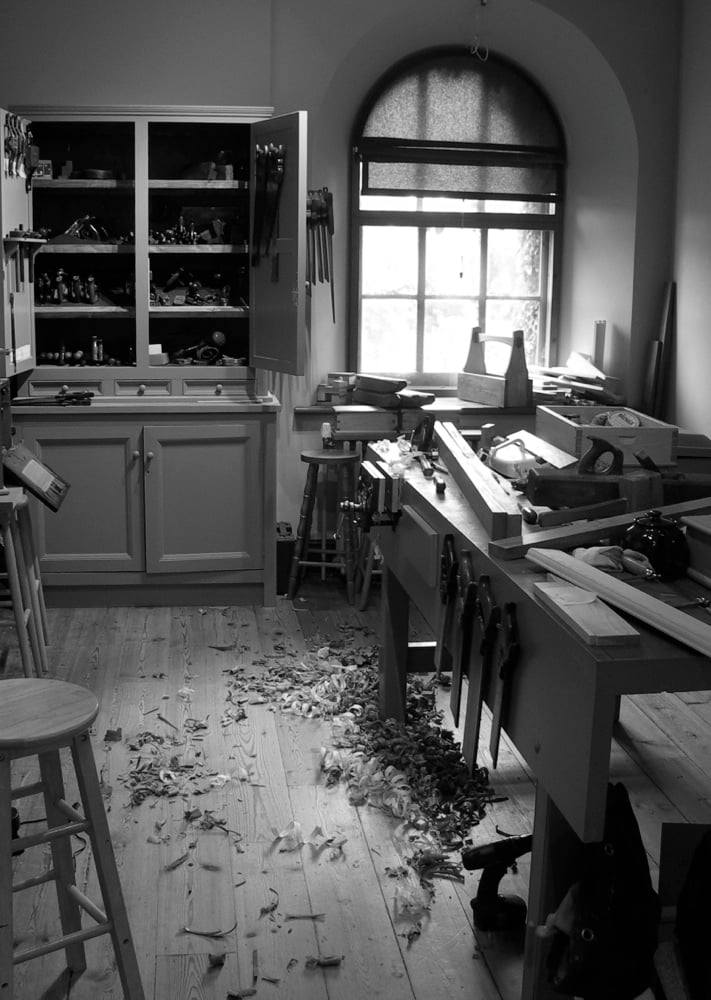
Over the more recent decades I have seen that woodworking can hardly be distilled into any particular camp and all the more so since the online presence of forums bringing every blend and hybrid to the table for sampling. New terms are used many of which are terms only but the practices are the same; a bit like the outer casing of a DeWalt drill changes but the gubbins inside remains principally the same. We’re forced to buy a new one every year not because the drill driver is worn out but the battery stops charging and the battery costs almost as much as a new drill driver. It’s a funny thing how fashion has invaded my craft. Ten years ago we had 12-volt drill drivers. Turn up on the job site today with any thing less than 18-volts and you’d likely be laughed off the site. I’m glad I left that world behind by choice and remained true to my goal in pursuing craft and skill. I changed the bandsaw blade on my 40 year old bandsaw today and enjoyed seeing the tension tighten the band to the wheels for some strange reasoning. just rambling again.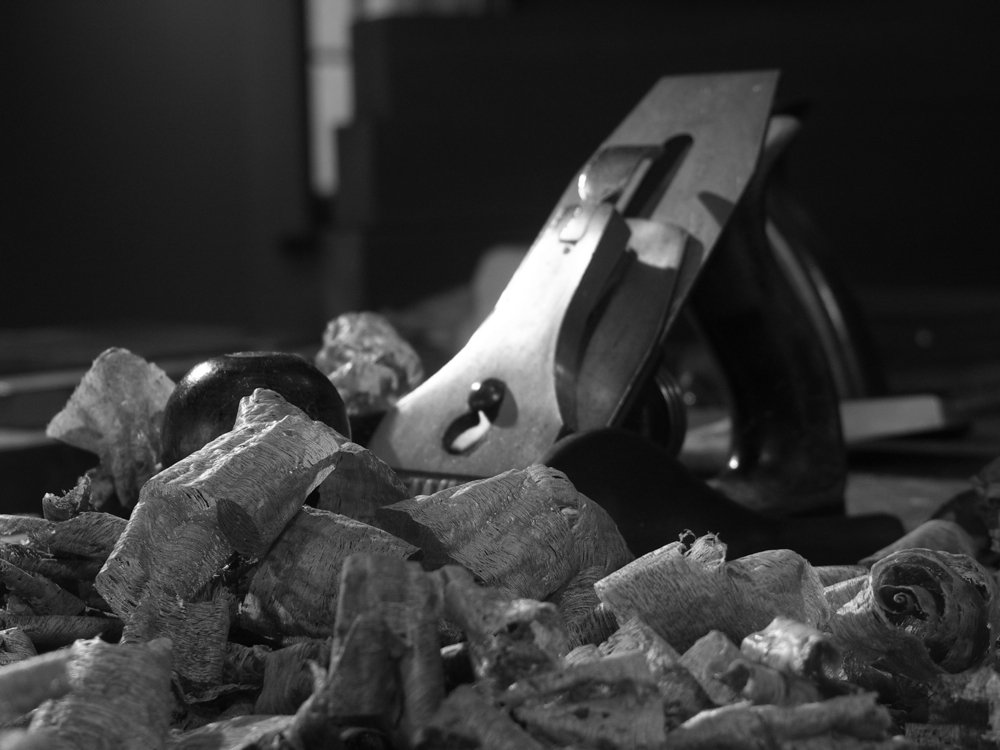
Machine woodworking—a highly charged situation
I do see what tugs at people working outside of the craft to earn their corn and feed their families but wanting leisure time to be filled with wood and working it. Not many readers here are woodworkers earning their living from their work. They have scant time at weekends to be creative and like to accomplish what they make as quickly as possible. The machine reduces labour time drastically for them and enables them to maximise the levels of accomplishment they want to within the allocated space we call recreation time. Slicing up the pie of time a weekend gives them between weekend chores around the house, car washing, mowing grass, cleaning house, time with family and some rest and relaxation too means woodworking (or any other craft creativity) is slotted in as best it can be. Machines do cut wood fast and minimise what many would refer to as wasted time. Many say it also drastically reduces the skill levels you need too. Here in is the rub for many. Machines do cut time costs down, but then you must figure some other cost thingies into the equation. Machines themselves don’t come cheap and it’s not just the cost of the machines themselves that I mean. Yes, there will not be too much change from £2,500 for four or five half decent machines whether you buy new or secondhand. But machines cost much in space too and boy do they quickly eat that up; I mean they do take up a lot of dedicated space; like a massive footprint of occupation around which you must constantly trip and tiptoe. Then there is what I call the hidden occupation. This is the one where the atmosphere you live and breath is totally charged; occupied if you will by a fine filtering extraction doesn’t quite grab. 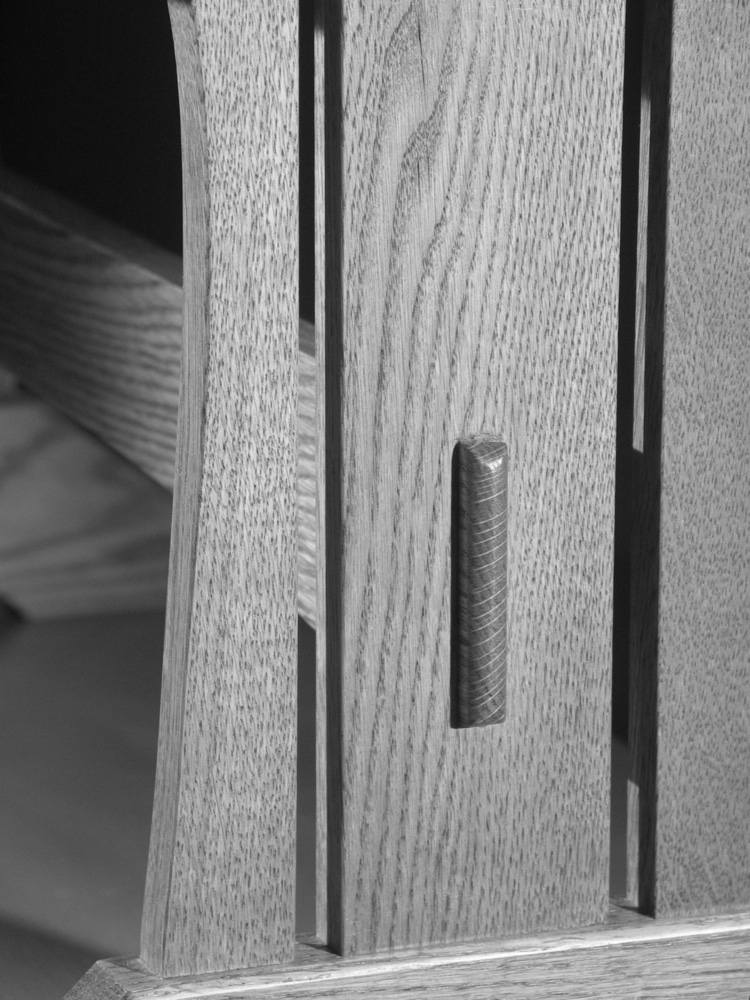
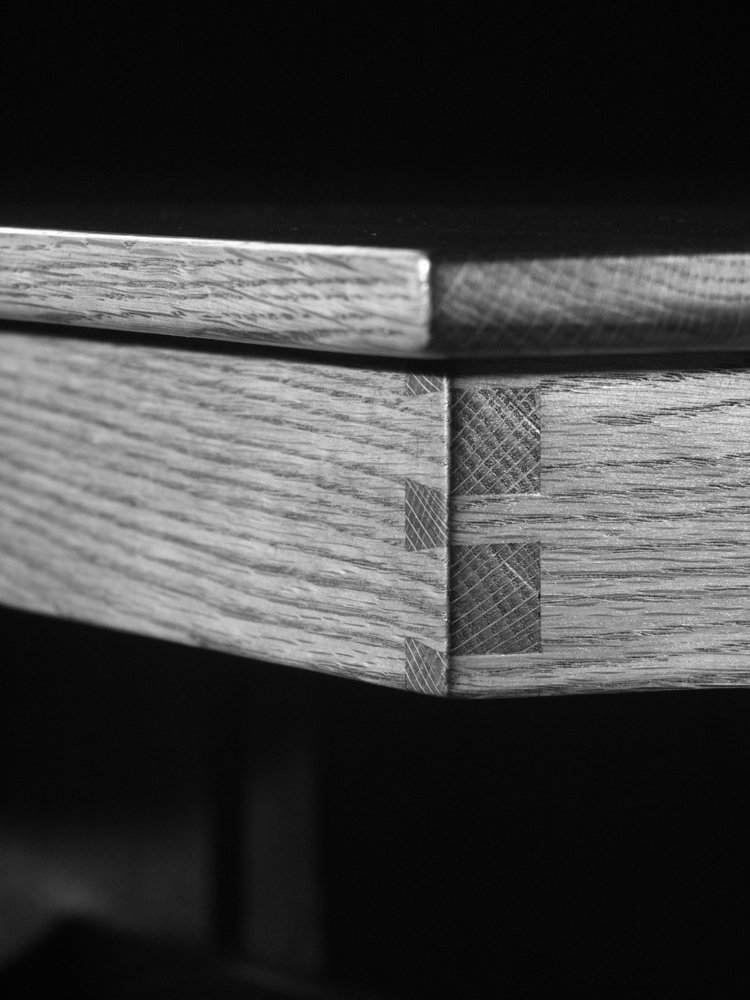
The competition between hand methods and machines
My US cousins might be surprised by the fact that here in the UK very few woodworkers have a machine shop. Many if not most have no machines at all. They just can’t give up the all too valuable space. Actually, I know a lot of US friends in woodworking that have no machines either, mostly because they live in an apartment or a rental house though. Mainland Europe is the same as the UK I think. I’d be interested to hear from 100 Europeans to see how many have a machine shop. Personally, I do own machines. I have a chopsaw, tablesaw, planer/jointer, drill press and three bandsaws. Most of my machines are old models, maybe 50 years old. They are not what we might call heavy industrial models, but they are for serious professional use say in a small one- or two-man shop. I can’t recall the last time I used the mortiser even though it is a very nice one, but the other machines I use every other week or so I suppose. I can go a month and not turn any of them on. Some of this is probably due to lack of space, but mostly it’s personal preference. The big questioning for me has and always will be why do people feel that there is a competition between hand methods and machines? Why do people think machines are always so much more efficient for everything when that’s not always the case? Why do people feel hand tools are old fashioned, highly demanding and slow… so very slow? You see you have to consider other factors when you use one method over another. Hand tools do demand skills and many woodworkers, amateurs and professionals (professional meaning they earn their living from carpentry of some type) no longer have these skills to rely on. I think that that’s why they tend to avoid them and use machines. 
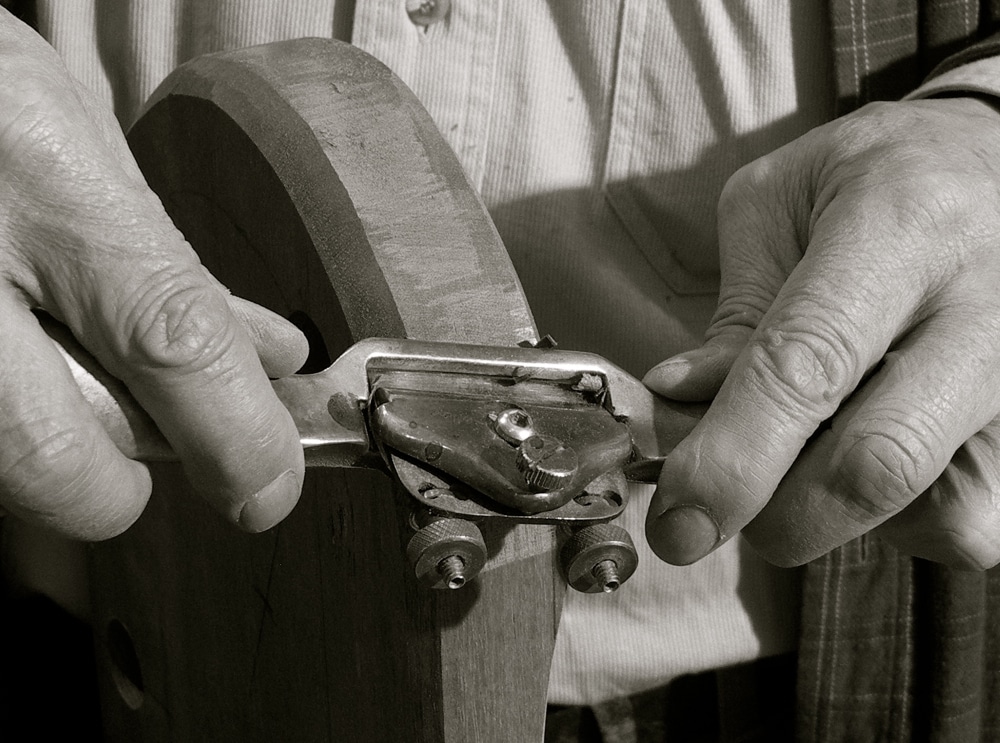
Oh, the black and whites? All hand work!


Having been brought up on machines to accomplish woodworking, yet being exposed to my fathers huge (and unused) collection of old hand tools, I’ve been doing a lot of thinking about this recently. Having had a hiatus from my woodworking hobby for the past 10 years or so, and about to move to my retirement home and set up shop anew, finding your blog and video’s has been timely. As I’ve grown older, I’ve become much more concerned about noise and dust and the damage they cause. I also know that I had spent much of my time with machines making jigs to accomplish tasks. You’ve convinced me to not replace all of the machines I once owned, but to try the hand tool route, and work and projects that might be more time consuming, but ultimately more rewarding. I do think a bandsaw for resaw work is in my future 🙂
By the way, like the B&W photos. I think they allow the viewer to be more focused on your subject matter. I’m not going to open the digital vs. film can of worms. Your off the hook on that subject.
Well fundamentally you can’t argue with the speed of taking a digital photo and putting it into a digital space like a blog though can you?
B&W: I agree completely, Marc. It’s great to see the finished piece in its full color glory. But to see what went into the final product, the shapes and shadows, the grain and even the tool marks take on much more significance in B&W.
I agree completely. Paul, as you have said several times before, it’s handy to have certain machines for the “donkey work”. But, after being enrolled in Woodworking Masterclasses for the last year and a half, I find myself turning to my very limited stock of machines less and less! When working with my hand tools that I have bought and lovingly restored, I get a feeling of pride, peace of mind and contentment. With the machines, it’s dust, noise, and danger. And then there is the cost factor: Though by no means not every tool I want (if there is such a level; I hope not!), I have a nice collection of woodworking hand tools. And if I totaled up the purchase prices for ALL of them, it would be nowhere near the cost of ONE high-end table saw or similar piece. Keep up the good work, my friend.
What about the accuracy a machine provide? How can I achieve (very) precise woodwork with hand tools? I’m asking because this is my main concern about working with hand tools. Is this a skill that will develop in time? I don’t have any machine for woodworking and I do all of my “weekend” woodwork only with hand tools and I enjoy it very much.
Yes, accuracy with hand tools takes skill and you must earn it, but it’s so worth it.
It was with great consideration that I have committed to a high quality combination machine (well, high quality within a compact footprint and budget for me). The primary purpose will be rapid stock reduction and thicknessing in order to focus on the actual woodworking. I purchase timber all the time for work but I also recycle timber all the time for work and my own use. Using a scrub plane and a recently restored Stanley 51/2 that was my fathers, amongst other planes I shaped a sill for a window I am installing, it was hard work, the timber is a piece of backsawn recycled jarrah with varying grain direction. Prepping was with an electric Makita to hog off the horrible outer layer of pasterboard glue dirt and rough sawn fibres and then finished with said handtools. It was also able to be done with handtools with my children nearby for some of it and later in the evening because they are quiet when I had the time and it was cooler for the next day. The intimacy and understanding that develop with the use of the handtools I think complements the usage of electric powered tools and machines, as they do the handtools. Each are highlighted on diferent levels to me yet there is greater personal satisfaction in using the handtools. Important criteria for the combination? Durability, accuracy, low noise, safety, good dust collection and good backup from the dealer. Donkey work is a good description- I do derive satisfaction at the sight of a ‘rubbish’ piece of hardwood thrown away that I have picked up and dimensioned to something usable and beautiful that I can then labour over being fed out of the end of the ‘donkey’. Important for the handtools? Appreciating and developing the fundamentals more often than not through restoring them and giving them another fifty (if not more) years after I have hopefully come a bit closer to mastering them.
Paul, perhaps it might be a worthwhile blog post to explain when you use the machines? It wouldn’t dilute your message, it would actually help us all understand the bigger picture. I’m sure you don’t let the machines take up valuable workshop/teaching space unless they earned that space?
I only use them to prep stock for classes where on a full class I can end up milling 500 pieces for one class. Other than that I really rarely use them. When we film I sometimes have to make three or four of a given project, again it makes sense to have spare parts milled but every project I make will have been made entirely by hand. Some times, maybe once a year, it will be prohibitive to work without some parts replicated by machine because we can’t afford to have staff hanging around for a few hours. But, really, I rarely ever use them.
I completely agree. I started on machines because that is what was being promoted in the magazines. I had no way of realizing the skills for hand tools. After finding Paul I’ve shifted to the middle. I use machines at the start of a project to joint, plane, and rip (sometimes) the stock. From that point, everything is hand tools. I don’t like dust or noise, so this works for me. With machines I would think about how to do it, with hand tools I just do it. I also have more confidence I can correct a mistake, and can stop before it gets too bad. Best of all I can start passing on these skills very early to my son and neighbors children without fear of losing fingers.
The title and mood of the first picture in this blog: End of the day. In color it would just be a corner of the workshop.
Well, I have a jointer, thicknesses, drill press, and bandsaw, and they are useful. But they not only occupy space in the ways you have described, they also require tools and time of their own for their maintenance and adjustment. If, as this hobbyist does, one sticks to stock prep, machines are quite efficient, but moving to joint cutting by machines involves apparently exponential increases in machine adjustment and set-up. My feeling is that’s not woodworking, but machine operation; for me less satisfying.
Paul you are right on. the dust, noise, time to set up. It may just be me but I also feel that using some machines is like cheating, I am just starting at using hand tools. I feel more of a challenge and it is more rewarding. but not easy trying to saw from a knife line is hard for me. You make it look so easy. practice practice practice is what i need.
Joseph’s cello teacher always said, “Practice makes permanent.” but he meant in the negative in that bad habits are established by doing something wrong over and over until it’s hard then to undo. I mean that “practice makes permanent” and also “perfect” if developed properly.
Sorry all but this argument for me is a simple one and it’s about quality of life.
Ear protection is a doddle in that muffs can be put on and removed in a moment.
Eye protection is similar.
Respiratory matters are slightly more tricky. Putting a well fitting mask on will eliminate dust particles to a size specified by the maker. But here’s the thing. When do you take the damned thing off? How long does it take to clear the shop of particles that are often invisible to the naked eye? My father has advanced lung problems which means very much reduced mobility in the years when he should be enjoying walks through the forests and along beaches.
I implore you all to take care of your lungs as they can only self repair to a certain degree.